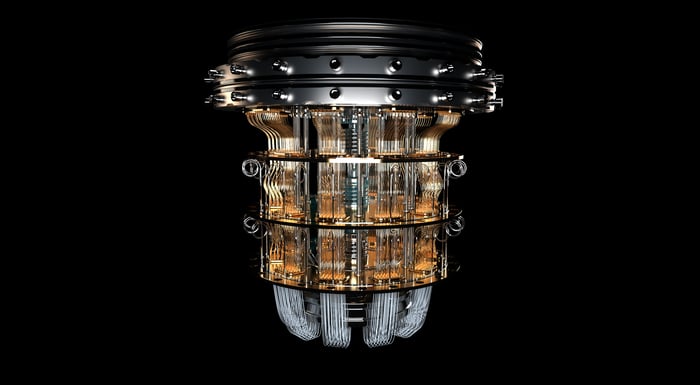3 Quantum Computing Stocks That Could Make a Millionaire

Key Points
IonQ is seeing huge success with its trapped ion approach.
D-Wave Quantum is taking a different approach to quantum computing than its peers.
Rigetti Computing already has a viable quantum computer available for purchase.
Quantum computing is the next big investment trend in the tech world. While artificial intelligence (AI) is still driving the market forward, the quantum computing arms race is heating up and could start to shape up over the next few years.
This is an exciting industry, as there are multiple competitors vying for quantum computing supremacy. While there is room for multiple winners, there will undoubtedly be multiple losers along the way. The key is to identify the companies with the most potential with the smallest size, as these are the ones most capable of making millionaires.
Where to invest $1,000 right now? Our analyst team just revealed what they believe are the 10 best stocks to buy right now. Learn More »
I've got three on my radar that have the potential to do it, although it's far from a surefire bet.

Image source: Getty Images.
1. IonQ
First off, I don't think all three of these stocks have the ability to make a millionaire simultaneously. The quantum computing market isn't going to be that large, and there will be many poorly performing investments along the way.
However, if I have to bet which one of the three will be the winner, I'd say IonQ (NYSE: IONQ). IonQ was the first quantum computing pure-play to go public, and it has been a popular pick ever since.
Instead of using the superconducting quantum computing approach like most of the larger competitors are doing, it uses a trapped ion approach, which gives it a few key advantages. First, the particle being used for quantum computing doesn't need to be cooled to absolute zero; it can be utilized at room temperature. This cuts down on input costs, making quantum computing more commercially viable for a wider range of applications. Second, the trapped ion approach offers impressive fidelity. IonQ holds world records in quantum computing accuracy, which is the primary hurdle that quantum computing companies are looking to overcome.
Time will tell if IonQ's approach is a winning one, but it has positioned itself nicely with the approach that it's taking.
2. D-Wave Quantum
D-Wave Quantum (NYSE: QBTS) is taking a different approach than nearly any company in the space. Instead of developing a broad-purpose quantum computer that can be applied to many applications, it's focusing on a specific approach that allows it to tackle problems in the most relevant fields.
D-Wave utilizes quantum annealing technology, which can be used for optimization and sampling problems by finding the lowest energy state in the system. This makes the technology useful for logistics networks and statistical calculations, which are two primary uses of quantum computers.
With D-Wave developing a solution that works well for a handful of use cases that are expected to be the largest markets, it may be a successful quantum computing pick.
3. Rigetti Computing
Lastly, there is Rigetti Computing (NASDAQ: RGTI), which utilizes the superconducting approach. This is a highly competitive space, as many of the larger quantum computing companies are developing the same technology. However, Rigetti Computing already has a significant head start on the competition, as it has the industry's largest multichip quantum computer. It has four 9-qubit chips that are tiled together, which makes it a commercially viable computer that can process complex calculations today.
Superconducting also has a big advantage over IonQ's trapped ion approach: speed. Rigetti's management claims that its gate processing speeds are over 1,000 times faster than a trapped ion computer. As quantum computing technology progresses to the point where the calculations are accurate enough, the industry will likely turn to processing speed as a determining factor for what system to buy, and it could propel Rigetti Computing to the top of the list.
Right now, it's difficult to determine which of these stocks will be a long-term winner. In fact, all three of them may go bust. As a result, investors must understand the risk and keep position sizing relatively limited, so that a portfolio isn't adversely affected by a significant investment in one of these three going south.
Another great alternative is to buy a quantum computing ETF. These don't have the upsides of individual stocks, but will provide solid returns if the quantum computing industry takes off.
Should you invest $1,000 in IonQ right now?
Before you buy stock in IonQ, consider this:
The Motley Fool Stock Advisor analyst team just identified what they believe are the 10 best stocks for investors to buy now… and IonQ wasn’t one of them. The 10 stocks that made the cut could produce monster returns in the coming years.
Consider when Netflix made this list on December 17, 2004... if you invested $1,000 at the time of our recommendation, you’d have $661,694!* Or when Nvidia made this list on April 15, 2005... if you invested $1,000 at the time of our recommendation, you’d have $1,082,963!*
Now, it’s worth noting Stock Advisor’s total average return is 1,067% — a market-crushing outperformance compared to 190% for the S&P 500. Don’t miss out on the latest top 10 list, available when you join Stock Advisor.
*Stock Advisor returns as of September 15, 2025
Keithen Drury has no position in any of the stocks mentioned. The Motley Fool has no position in any of the stocks mentioned. The Motley Fool has a disclosure policy.







